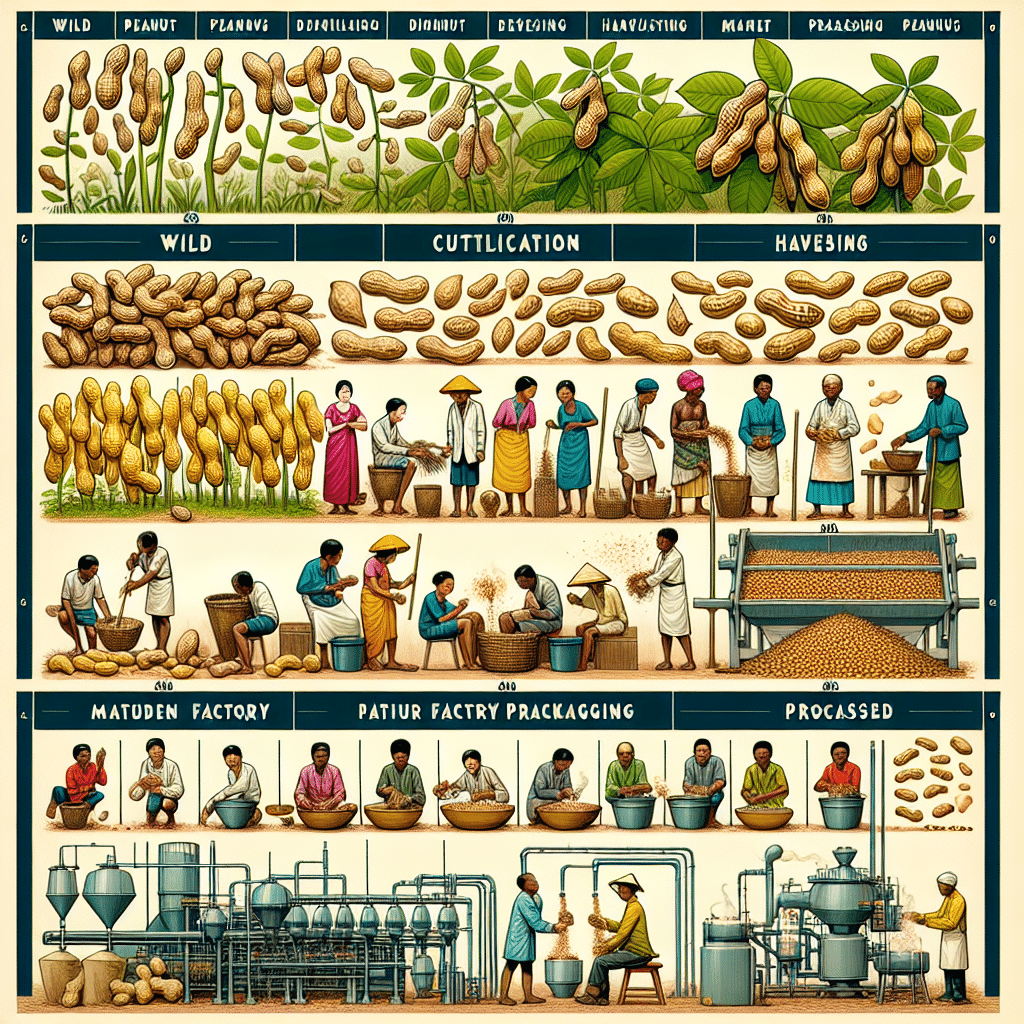Peanut Origin: Unearthing The Nutty Beginnings
-
Table of Contents
- Peanut Origin: Tracing the Nutty Beginnings of a Global Favorite
- The Ancient Roots of the Peanut
- The Peanut’s Journey Across the Globe
- The Cultural Impact of Peanuts
- The Science and Botany of Peanuts
- Modern Peanut Production and Challenges
- Conclusion: The Enduring Legacy of the Peanut
- Discover ETprotein’s High-Quality Peanut Protein Products
Peanut Origin: Tracing the Nutty Beginnings of a Global Favorite

The humble peanut, also known as the groundnut or goober, is a staple in diets around the world, beloved for its rich flavor and nutritional value. But where did this popular legume originate, and how did it become a global phenomenon? In this article, we’ll delve into the fascinating history of the peanut, exploring its origins, its journey across continents, and its impact on various cultures and economies.
The Ancient Roots of the Peanut
Peanuts are believed to have originated in South America, with archaeological evidence suggesting that ancient cultures in modern-day Bolivia and Peru cultivated peanuts as far back as 7,600 years ago. These early peanut plants were likely quite different from the varieties we know today, but they played a significant role in the diet and culture of pre-Columbian societies.
- Archaeological findings: Pottery shaped like peanuts and decorated with peanut motifs have been discovered, indicating the cultural significance of the nut.
- Domestication: The process of domestication likely led to the selection of more desirable traits, such as larger seeds and thinner shells.
- Spread across South America: The cultivation of peanuts spread throughout the continent, with evidence of their use in Brazil and Argentina as well.
The Peanut’s Journey Across the Globe
With the arrival of European explorers in the New World, peanuts began their global journey. Spanish and Portuguese traders brought peanuts back to Europe, and from there, they spread to Africa and Asia.
- Introduction to Africa: Peanuts thrived in the African climate and quickly became an integral part of the agricultural and culinary landscape.
- Slave trade and the Americas: Enslaved Africans brought peanuts to North America, where they became a key food source, especially in the Southern United States.
- Asian cultivation: In Asia, peanuts found a new home, particularly in China and India, where they became important oilseed crops.
The Cultural Impact of Peanuts
Peanuts have had a profound impact on the cultures they’ve touched, influencing cuisine, agriculture, and even politics.
- Cuisine: From African peanut stews to Chinese kung pao chicken, peanuts have been incorporated into countless traditional dishes.
- Agriculture: As a nitrogen-fixing crop, peanuts have played a role in sustainable farming practices and crop rotation.
- Economic and political influence: The peanut industry has shaped economies, such as in the United States with the rise of peanut farming and figures like George Washington Carver.
The Science and Botany of Peanuts
Botanically speaking, peanuts (Arachis hypogaea) are not true nuts but legumes, related to beans and lentils. They grow underground, which is unusual for members of the legume family. This unique characteristic has fascinated botanists and contributed to the peanut’s spread, as it can be cultivated in a variety of soils.
- Botanical classification: Understanding the peanut’s classification helps in breeding programs and agricultural research.
- Genetic studies: Modern genetic research has traced the peanut’s ancestry and helped improve crop resilience and yield.
Modern Peanut Production and Challenges
Today, peanuts are a global commodity, with China, India, and the United States leading in production. However, the industry faces challenges such as climate change, pests, and the need for sustainable practices.
- Leading producers: Insights into the top peanut-producing countries and their methods.
- Sustainability: The importance of sustainable peanut farming to ensure future supply.
- Health concerns: Addressing issues like peanut allergies and the impact on consumption and production.
Conclusion: The Enduring Legacy of the Peanut
The peanut’s journey from its origins in South America to its status as a global culinary staple is a testament to its versatility and appeal. Its rich history is interwoven with the stories of cultures around the world, and its future promises to be just as dynamic. As we continue to enjoy peanuts in various forms, from peanut butter to oil, we also recognize the importance of addressing the challenges facing peanut production to ensure this nutty favorite remains a part of our diets for generations to come.
Discover ETprotein’s High-Quality Peanut Protein Products
If you’re interested in incorporating the nutritional benefits of peanuts into your diet or products, ETprotein offers a range of high-quality peanut protein options. Their peanut protein is perfect for those looking to enhance their protein intake with a plant-based, non-GMO, and allergen-free alternative. Whether you’re in the food and beverage industry or seeking to improve your personal health and wellness, ETprotein’s products are an excellent choice.
About ETprotein:
ETprotein, a reputable protein Chinese factory manufacturer and supplier, is renowned for producing, stocking, exporting, and delivering the highest quality organic bulk vegan protein and plant proteins. They include Organic rice protein, clear rice protein, pea protein, clear pea protein, pumpkin seed protein, sunflower seed protein, mung bean protein, peanut protein etc. Their offerings, characterized by a neutral taste, non-GMO, allergen-free attributes, cater to a diverse range of industries. They serve nutraceutical, pharmaceutical, cosmeceutical, veterinary, as well as food and beverage finished product distributors, traders, and manufacturers across Europe, USA, Canada, Australia, Thailand, Japan, Korea, Brazil, and Chile, among others.
ETprotein specialization includes exporting and delivering tailor-made protein powder and finished nutritional supplements. Their extensive product range covers sectors like Food and Beverage, Sports Nutrition, Weight Management, Dietary Supplements, Health and Wellness Products, and Infant Formula, ensuring comprehensive solutions to meet all your protein needs.
As a trusted company by leading global food and beverage brands and Fortune 500 companies, ETprotein reinforces China’s reputation in the global arena. For more information or to sample their products, please contact them and email sales(at)ETprotein.com today.














